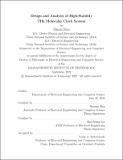Design and Analysis of High-Stability THz Molecular Clock System
Author(s)
Kim, Minah
DownloadThesis PDF (9.046Mb)
Advisor
Han, Ruonan
Lee, Hae-Seung
Terms of use
Metadata
Show full item recordAbstract
Miniaturized frequency references with high stability are crucial for applications such as navigation and wireless networking. Recently, chip-scale molecular clocks (CSMCs) have achieved excellent stability performance by using a rotational-mode transition of gaseous carbonyl sulfide (¹⁶O¹²C³²S). Its low-cost implementation and robustness against external electrical/magnetic fields make a CSMC an attractive candidate for a high-stability clock. However, even though an invariant OCS transition frequency is used as the reference, non-idealities such as tilted baseline of spectroscopic probing and input offsets of dc amplifiers lead to the frequency error between the actual transition frequency (𝑓₀) and the detected transition frequency. Since these nonidealities are susceptible to environmental variations, it affects the long-term stability of the clock. In addition, the short-term stability of a CSMC is limited by the spectroscopic signal-to-noise ratio.
In this work, the effects of noise and environmental variations on clock stability were analyzed to provide guidance for the design and optimization of CSMCs. Also, a dual-loop CSMC is demonstrated to address the issues in the previous CSMCs and further improve stability performance. The prototype chip implemented in 65nm CMOS technology achieves 2 ×10⁻¹¹ Allan Deviation at 10,000-s averaging time with 71-mW power consumption. It demonstrates that CSMCs can provide outstanding stability performance while maintaining cost, complexity, and power consumption advantages.
Date issued
2022-09Department
Massachusetts Institute of Technology. Department of Electrical Engineering and Computer SciencePublisher
Massachusetts Institute of Technology